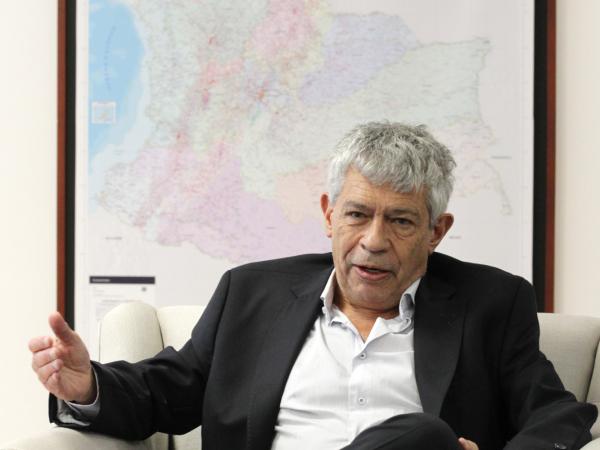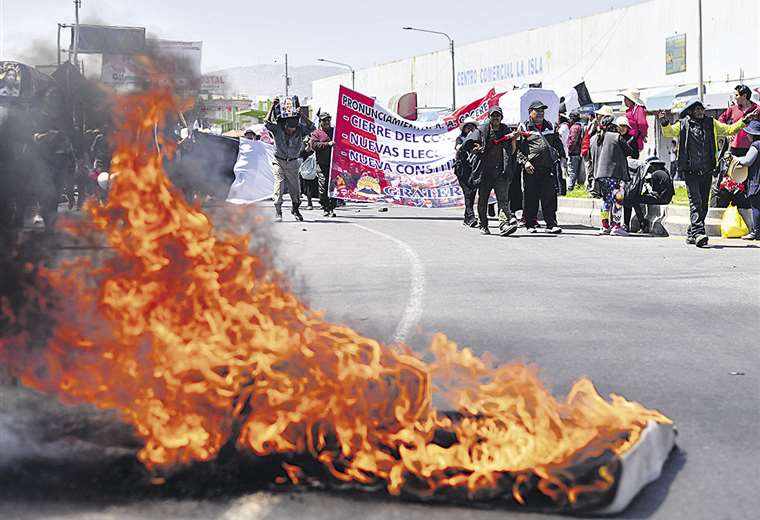Several years ago Chile was listed as an example of anti-corruption in Latin America. It was not meridian to think that politics and drug trafficking, for example, had some kind of link in the country. Today the reality is different. The uncovering of the illegal financing of politics, the impunity that prevailed over the case and the current scandal that has former mayor Raúl Torrealba in its sights, are just a few signs that corruption is far from being an alien problem in the country.
The municipalities of Vitacura, Maipú, Ñuñoa, Viña del Mar, Puerto Varas and San Ramón are in the eyes of justice for embezzlement of public funds or tax fraud, given the irregularities that occurred in previous administrations. Cases that were perpetrated almost 10 years ago, but that are only now seeing the light at the judicial level. On Monday, January 9, the oral trial against the former mayor of Puerto Varas, Álvaro Berger, began after being charged with tax fraud and fraudulently obtaining tax benefits. Pedro Sabat, former mayor of Ñuñoa, is awaiting his oral trial –set for February 10, 2023, at 9:00 a.m.–, after being charged with illegal negotiation. A week ago, Jacqueline Sánchez and María Luisa Pizarro, former officials of the Maipú Municipal Education Corporation, were formalized during the administration of former mayor Cathy Barriga, for misuse of more than $2.2 billion that came from the Ministry of Education.
Bribery, tax fraud and embezzlement are the crimes that are most repeated in the convictions and formalizations that were reviewed for this ranking. Illegal crimes involving political party members (when the crime was perpetrated) and people in elected positions who have received a sentence in the last five years were compiled through open sources. Those cases where the militancy of convicted persons and those who received a judicial resolution before 2017 were not verified were left out of the analysis. The year of execution of the crime was not considered, but the year of resolution of the process.
In addition, those cases in which the militants achieved an alternative solution were considered, since, in order to reach such a resolution, it is necessary to assume a degree of responsibility in the case in question. Mayors, councillors, advisers, secretaries, representatives and senators can be found on the list, but – without a doubt – the events that most evidenced the most disappointing side of the policy were the Corpesca, Penta and SQM cases. These last two still have pending sentences against politicians, as is the case with Juan Pablo Longueira and Marco Enríquez-Ominami in the case of Soquimich, cases that were not considered in the analysis because they still do not have a resolution.
Results
Nearly 200 cases were reviewed in which the policy was linked to the crime. Of these, only in 35 was it possible to verify the militancy of the person involved and it was also possible to verify that the judicial resolution –either conviction or alternative exit– was given in 2017. Although we can see that they cross all political sectors, the UDI is the party with the most convictions for crimes and, mostly, for corruption crimes. Almost all the convictions or alternative exits that the UDI military obtained occurred as a result of the SQM case for the issuance of ideologically false ballots.
- Independent Democratic Union (UDI): Twelve people were sentenced or obtained an alternative exit for issuing ideologically false ballots or for irregular financing of political campaigns. Six people were elected to a position by popular vote and the other six correspond to party members. Among the notable characters are the current senator Iván Moreira for irregular financing of politics, as well as the former deputy Marta Isasi and the former mayor of Santiago Pablo Zalaquett. Former Senator Jaime Orpis was convicted of tax fraud, as was Pablo Wagner, who was Undersecretary of Mining in the first Government of Sebastián Piñera.
- National Renewal (RN): Six correspond to the party that today is in the crosshairs after the Torrealba case. Although irregular financing in political campaigns also gave rise to those responsible in the party, the judicial resolutions occurred before 2017, as is the case with the PS, the DC and the PPD. Among the most recent cases is that of former councilor Karim Chahuán –relative of the party’s president, Francisco Chahuán–, for robbery in an uninhabited place in the context of the social outbreak; Claudio Eguiluz, current regional president of the community in Biobío, for issuing ideologically false tickets to SQM; and Marcelo Torres, former Maipú councilor convicted of bribery and money laundering in the Basura case.
- Democratic Independent Regionalist Party (PRI): There were three cases that finished processing in 2017, which were linked to the illegal financing of politics. That same year, the collective did not obtain the signatures to maintain its legal status, which led to its dissolution as a political party.
- Parties of the former Concertación/former New Majority: Between the DC, the PS and the PPD, 7 cases were confirmed in which representatives of said parties were convicted. The majority, for the Penta and SQM cases. One of the frauds that stands out is the one carried out by the brother of former President Eduardo Frei Ruiz-Tagle, Francisco Frei (former DC), who was convicted of malicious check drawing.
This list, although it compiles the last five years of crimes linked to politics, could not cover the most emblematic cases of corruption in recent times, which are awaiting progress. For example, that of Virginia Reginato (UDI), who is being investigated by the Public Ministry for the “Overtime 2” case, and the case that led to the coining of the term “narcopolitics” in Chile, related to Miguel Ángel Aguilera, former socialist mayor of San Ramon. The latter is in pretrial detention and, as in the previous cases, could agree to an abbreviated trial if the former community chief pleads guilty. In such a situation, the Public Prosecutor’s Office would offer a sentence of 819 days of imprisonment for minors in its medium degree, 7 years without holding public office and a fine of almost $20 million. This is how cases such as that of Karina Oliva (former Comunes) and her irregular expenses in her campaign for governor are added.
After consulting the press team of the party that leads the ranking, the UDI, declared that they preferred not to refer to the subject. The general secretary of RN, Diego Schalper, was also consulted in this regard, however, he declared that he would adhere to the public statement of the party, which he published when the Torrealba case exploded: “We consider that these events are serious and therefore must be investigated until the last consequences and, if there are crimes, identify those responsible and make the corresponding responsibilities effective”, was what the community pointed out at the time. And he added the following: “National Renovation respects and promotes that the institutions fulfill their function with autonomy and rigor. For this reason, we believe that justice must fulfill its role in depth, without any distinction, always ensuring the principles of the Rule of Law “.
On the other hand, the one who did want to speak was Mario Desbordes, former president of RN, who intends to rearm a front of internal opposition to the current directive: “What we have to do is, due to the parliamentary force that we have, establish draconian controls on any official public office in which corruption can occur”. This, because the internal rules of the parties would remain mere sanctions and “the possibility of avoiding the act of corruption is not improved,” added the former Defense Minister.
Overflows stated that he believes that the most effective way to avoid these events is to increase the penalties and a greater supervisory capacity, which does not exist today: “In every place where public funds are managed, for example, in State companies, there should be very strict transparency rules, the maximum of the rules of public purchases and sales should be applied, there should be oversight by the Comptroller’s Office”.
There is no public apparatus to curb corruption
It is true that there are places where control does not reach. Opaque places where there is no legal alternative to fully investigate. This was stated by the president of the Council for Transparency (CPLT), Francisco Leturia, last December, when he shed light on the precariousness of the surveillance system on corruption cases: “We are not going to get anything if we continue investigating when we discovered the facts and we have to wait for a friend to betray a friend to discover a case of corruption,” he said, referring to the Torrealba case and the Municipality of Vitacura. It is that this whole case was uncovered by a self-report made by Domingo Prieto, a friend of the former mayor of said commune, who revealed what was happening in the fiscal coffers of the eastern sector municipality and his friend.
The expert Alberto Precht, who was executive director of Chile Transparente and who is an expert lawyer in anti-corruption, explains that “the areas where one can find more of these crimes are going to be those where there is concentration of power, monopoly of the decision and low levels of transparency. Precht adds that the end of the re-election in the municipalities brought good news for surveillance, since a space is enabled for external audits and complaints that did not occur before.
Likewise, he believes that the main measures that must be taken in these cases are in the direction of giving a lesser range of options for the authority investigated for corruption, for example, “alternative solutions should not exist,” he points out. In addition, he agrees with Leturia that the Comptroller General of the Republic should have greater power to oversee municipal corporations and foundations.
For the lawyer, the most serious thing about having lax measures and little surveillance is that a sense of impunity perches over the crimes committed by the authorities and, with that, “a process of decay of the social fabric begins to exist because, the same People, by stopping believing in the fabric, begin to behave outside of it”.








